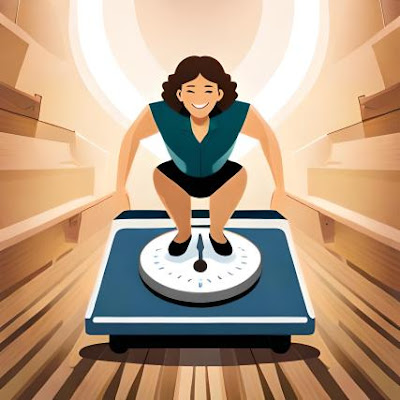10 essential way: how to Lose weight fast in 2 Weeks 10 kg
Hey there! Are you looking to shed some extra weight? Well, you've come to the right place! In this blog post, we'll explore ten essential ways how to lose weight fast in 2 weeks 10 kg. But hold on! We believe in safety first, so our focus will be on doing it the right way — the healthy way.
Now, quick fixes and crash diets might promise rapid results, but they can be harmful to your body. Our aim is to guide you towards a sustainable weight loss journey, where you can shed those kilos while still taking care of your well-being. Remember, it's not just about the numbers on the scale; it's about feeling good inside and out!
So, let's dive into these ten essential strategies that will help you reach your weight loss goals in a safe and user-friendly way. Get ready to transform your lifestyle and embrace a healthier, happier you!
Step 1: Set Realistic Goals and Expectations
Alright, before we jump into the nitty-gritty of losing weight, let's talk about setting goals. It's important to be realistic and practical about what you can achieve. Losing 10kg in just two weeks might sound tempting, but it's not safe or sustainable.
Instead, focus on setting smaller, achievable goals. Maybe aim to lose 1-2kg per week. That way, you'll be working towards a healthier weight loss journey without putting too much strain on your body.
Remember, weight loss is a gradual process, and everyone's journey is different. So, be patient with yourself and celebrate even the smallest victories along the way.
It's also essential to manage your expectations. Losing weight doesn't mean you'll magically transform overnight. Making small changes to your lifestyle today can lead to big improvements in your health and happiness in the future
So, take a moment to think about what you want to achieve and set realistic goals that will keep you motivated throughout your weight loss journey. Remember, slow and steady wins the race!
Step 2: Create a Calorie Deficit
Okay, let's talk about calories. They're the units that measure the energy we get from food. When it comes to losing weight, creating a calorie deficit is an important key.
But what does that mean? Well, a calorie deficit happens when you consume minimum calories that your body needs to maintain its current weight. This prompts your body to burn stored fat for energy, leading to weight loss.
To create a calorie deficit, you can start by figuring out how many calories your body needs each day. There are online calculators that can help with this, but remember, they're just estimates.
Once you have an idea of your daily calorie needs, you can aim to consume slightly fewer calories than that. But be careful! It's essential to create a moderate deficit. Drastically cutting calories can be harmful to your health and make you feel deprived.
You should aim to reduce your calorie intake by 500-750 calories per day. This gradual approach is safer and more sustainable. You can achieve this by making smart food choices and being mindful of portion sizes.
Step 3: Prioritize a Balanced Diet
When it come to losing weight, what you eat in your routine life plays a significant role. It's time to talk about having a balanced diet!
A balanced diet means eating a variety of foods that provide your body with the nutrients it needs to stay healthy. Here are some tips to help you prioritize a balanced diet:
1. Include all food groups: Make sure your meals contain foods from different food groups, such as fruits, vegetables, whole grains, lean proteins, and healthy fats. Each group offers unique nutrients that contribute to your overall well-being.
2. Load up on fruits and veggies: These colorful wonders are packed with vitamins, minerals, and fiber. Aim to have at least five servings of fruits and vegetables each day. You can have them fresh, frozen, or even in smoothies.
3. Choose whole grains: Swap refined grains like white bread and white rice for whole grains like brown rice, whole wheat bread, and quinoa. Whole grains provide more fiber and nutrients, keeping you satisfied for longer.
4. Opt for lean proteins: Include sources of lean protein, such as chicken, fish, beans, and tofu. They help build and repair muscles while keeping you full. Don't forget to vary your protein sources to get a range of nutrients.
5. Don't fear fats: Not all fats are bad for you! you should include healthy fats from sources like avocados, seeds, nuts, olive oil, etc. These fats are good for your heart and can keep you feeling satisfied.
6. Mind your portions: While a balanced diet is essential, it's still important to watch your portion sizes. Use smaller plates the usual and listen to your body's hunger & fullness to avoid overeating.
Remember, a balanced diet is not about strict rules or cutting out entire food groups. It's about nourishing your body with a wide range of nutrients and enjoying your meals. So, have fun exploring new recipes and flavors while taking care of your health along the way!
Step 4: Get Moving with Regular Physical Activity
Time to get your body moving! Regular physical activity is crucial for weight loss and overall well-being. Here are some simple ways to increase your activity levels:
1. Start with walking: Walking is a fantastic and beginner-friendly exercise. Take a stroll around your neighborhood, walk your dog, or use the stairs instead of the elevator. Every step counts!
2. Try cardio exercises: Cardiovascular exercises, like jogging, cycling, or dancing, get your heart rate up and burn calories. Find some activities that you enjoy and make it a part of your routine. Aim for a minimum 150 min of moderate-intensity cardio each week.
3. Include strength training: Building muscle helps boost your metabolism and tone your body. Try activities like lifting weights, bodyweight exercises, or using resistance bands. So if you are beginner then start with lighter weights and gradually increase as you get stronger.
4. Embrace high-intensity interval training (HIIT): This workout involves short bursts of intense exercises followed by periods of rest. They are efficient and most effective for burning calories. Look for HIIT workout videos online or try interval training on a stationary bike or treadmill.
5. Find activities you love: Make exercise enjoyable by finding activities that make you happy. It could be swimming, dancing, playing a sport, hiking or cycling. When you have fun, then stick with it!
6. Incorporate movement into your day: Look for opportunities to be active throughout the day. Take active breaks at work, do household chores energetically, or have a dance party in your living room. Be creative and find ways to move your body!
Remember, start slowly and gradually increase your activity level. Always listen to your body and don't push yourself too hard. Consistency is key, so aim for at least 15-30 minutes of exercise most days of the week.
By adding physical activity to your routine, you'll not only burn calories but also improve your fitness, boost your mood, and increase your energy levels.
Step 5: Stay Hydrated for a Healthy Weight Loss
Let's talk about the importance of staying hydrated during your weight loss journey. Drinking enough water is essential for your overall health and can even aid in weight loss. Here's why hydration matters:
1. Boosts metabolism: Drinking water can help increase your metabolism, which is the rate at which your body burns calories. When your metabolism is functioning well, you may find it easier to lose weight.
2. Controls hunger: Sometimes, we confuse thirst with hunger. By staying hydrated, you can avoid unnecessary overeating and snacking. Next time you feel hungry, try sipping water first to see if it curbs your appetite.
3. Supports digestion: Water is crucial for proper digestion and absorption of nutrients. It helps move food through your digestive system smoothly and prevents constipation.
4. Replaces sugary drinks: Many sugary beverages like soda and fruit juices are high in calories and can sabotage your weight loss efforts. By choosing water as your go-to drink, you're cutting out those unnecessary calories.
So, how can you stay hydrated?
1. Drink water throughout the day: Aim to drink at least 8 glasses (around 2 liters) of water daily. Always carry a water bottle with you so you can remind yourself to sip regularly.
2. Flavor it naturally: If plain water isn't your thing, add a squeeze of lemon, lime, or a few fresh berries for a hint of flavor. Avoid sugary drink mixes or artificially sweetened beverages.
3. Set reminders: If you tend to forget to drink water, set reminders on your phone or use apps that send you hydration alerts.
4. Eat water-rich foods: Some fruits and vegetables, like watermelon, cucumber, and oranges, have high water content. Snack on these hydrating foods to supplement your water intake.
Remember, everyone's water needs may vary based on factors like activity level, climate, and individual body requirements. Pay attention to your body's signals, such as feeling thirsty or having dark urine, as signs that you may need more water.
By staying hydrated, you're not only supporting your weight loss goals but also benefiting your overall health. So, sip on that refreshing H2O and keep your body hydrated and happy!
Step 6: Cut Down on Processed Foods and Sugar
When it comes to losing weight, it's important to pay attention to the types of foods you eat. Processed foods and sugar can be major culprits that hinder your progress. Here's why you should limit them:
1. High in calories: Processed foods often contain added sugars, unhealthy fats, and extra calories. Consuming these foods regularly can lead you to weight gain.
2. Lack of nutrients: Processed foods are usually stripped of essential nutrients during manufacturing. They don't provide the same level of vitamins, minerals, and fiber as whole foods.
3. Trigger overeating: Many processed foods are designed to be addictive, making it easy to overeat them. They often lack the satiety (fullness) factor that whole foods provide, leading to cravings and more snacking.
4. Raise blood sugar levels: Foods high in added sugars, like soda, candy, and sugary snacks, can cause blood sugar spikes and crashes. This can leave you feeling tired, craving, and hungry for more sugary foods.
To reduce your intake of processed foods and sugar, here are some tips:
1. Choose whole foods: Opt for whole, unprocessed foods like fruits, vegetables, lean meats, and whole grains. These foods are nutrient-rich and support your weight loss goals.
2. Read food labels: Check the ingredient list and nutrition facts panel when buying packaged foods. Avoid products with added sugars, unhealthy fats, and long lists of unrecognizable ingredients.
3. Cook at home: By preparing your meals at home, you have control over the ingredients. Use fresh ingredients and experiment with spices and herbs to add flavor.
4. Swap sugary snacks: Instead of reaching for candy or cookies, choose healthier alternatives like fresh fruit, yogurt, or nuts. These options satisfy your sweet tooth while providing nutrients.
Remember, it's okay to enjoy processed foods and sugary treats occasionally in moderation. The goal is to make them occasional indulgences rather than everyday staples.
By reducing your intake of processed foods and sugar, you'll be nourishing your body with wholesome, nutrient-dense foods that support your weight loss journey. So, be mindful of your choices and opt for whole, unprocessed options as much as possible. Your body will thank you!
Step 7: Enjoy Your Food with Mindful Eating
When it comes to eating, being mindful can make a big difference in your weight loss journey. Mindful eating means paying attention to your food and the experience of eating. Here's why it matters:
1. Slows down eating: Mindful eating helps you slow down and savor each bite. By eating more slowly, you give your body time to recognize when it's full, preventing overeating.
2. Recognizes hunger and fullness cues: By tuning in to your body, you can better understand when you're truly hungry and when you're comfortably full. This helps you avoid eating out of boredom or emotional triggers.
3. Appreciates food: Mindful eating encourages you to appreciate the flavors, textures, and aromas of your food. It enhances your enjoyment and satisfaction from eating, making the experience more fulfilling.
To practice mindful eating, try these simple tips:
1. Eat without distractions: Avoid eating while watching TV, working on your computer, or scrolling through your phone.
2. Chew your food thoroughly: Take your time to chew your food well. This not only aids digestion but also allows you to fully taste and appreciate the flavors.
3. Listen to your body: Before reaching for seconds, pause and check in with your hunger and fullness levels. Eat until you're satisfied, not overly stuffed.
4. Keep a food journal: Write down what you eat, how it makes you feel, and any patterns you notice. This helps you become more aware of your eating habits and emotions related to food.
5. Practice gratitude: Take a moment before your meal to express gratitude for the food in front of you. Cultivating a sense of gratitude can foster a positive relationship with food.
Remember, mindful eating is about creating a healthy relationship with food and enjoying the experience. It's not about strict rules or restrictions. By practicing mindful eating, you can build a better connection with your body and make conscious choices that support your weight loss goals.
So, take a deep breath, slow down, and savor each bite. Let your mealtime become a mindful and pleasurable experience that nourishes both your body and soul.
Step 8: Get Enough Sleep for a Healthy Weight Loss
Did you know that getting sufficient sleep plays a role in weight loss? It's true! When you don't get enough rest, it can affect your metabolism, hunger hormones, and overall well-being. Here's why sleep matters:
1. Regulates hunger hormones: Lack of sleep can disrupt the hormones that regulate appetite, making you feel hungrier and increasing cravings for unhealthy foods.
2. Impacts metabolism: Sleep deprivation can slow down your metabolism, making it harder for your body to burn calories efficiently.
3. Affects energy levels: When you're tired, you may feel sluggish and have less energy for physical activity. This can interrupt your weight loss efforts.
So, how can you improve your sleep quality and duration? Here are some tips:
1. Stick to a sleep schedule: Establish a consistent sleep routine by going to bed and waking up at the same time every day, even on weekends.
2. Create a sleep-friendly environment: Make your bedroom comfortable, cool, and dark.
3. Unwind before bed: Establish a relaxing bedtime routine to signal your body that it's time to sleep. Avoid stimulating activities or electronics right before bed.
4. Limit caffeine and alcohol: Avoid consuming caffeine or alcohol close to bedtime, as they can disrupt your sleep patterns.
5. Manage stress: Practice stress management techniques, such as deep breathing, meditation, or journaling, to calm your mind before sleep.
6. Get regular physical activity: Engaging in regular exercise can help improve sleep quality. Just make sure to avoid vigorous exercise too close to bedtime, as it can be stimulating.
Remember, the recommended amount of sleep varies for each person, but most adults need 7-9 hours of quality sleep per night. Find what works best for you and prioritize sleep as an essential part of your weight loss journey.
Step 9: Manage Stress Levels for Weight Loss Success
When it comes to losing weight, managing stress is essential. Stress can affect your body in various ways and hinder your weight loss progress. Here's why stress management matters:
- Emotional eating: Stress often leads to emotional eating, where you turn to food for comfort. This can derail your weight loss efforts.
- Hormonal impact: Stress trigger the release of cortisol, a hormone that can increase your appetite and promote fat storage, especially around the belly area!!.
- Disrupts sleep: Stress can make it harder to sleep, and as we discussed earlier, lack of sleep can impact weight loss.
To manage stress effectively, try these simple strategies:
- Practice relaxation techniques: Deep breathing exercises, meditation, or gentle yoga can help calm your mind and reduce stress levels.
- Engage in physical activity: Regular exercise not only helps with weight loss but also reduces stress and improves mood.
- Prioritize self-care: Set aside time for activities you enjoy, whether it's reading, listening to music, taking baths, or spending time in nature.
- Seek support: Talk to friends and family, or a therapist about your stressors. Sharing your feelings can provide relief and new perspectives.
Remember, managing stress is crucial for your overall well-being, not just weight loss. By finding healthy ways to cope with stress, you'll create a more balanced and positive lifestyle that supports your weight loss goals. So, take a deep breath, focus on self-care, and let go of stress to pave the way for weight loss success.
Step 10: Track Progress and Stay Motivated
Congratulations on your weight loss journey so far! Now, it's time to track your progress and stay motivated along the way. Here's why it's important:
1. Celebrate achievements: By tracking your progress, you can see how far you've come. Celebrate even the smallest victories, like fitting into a pair of jeans or feeling more energized.
2. Identify patterns: Tracking helps you identify patterns in your eating habits, exercise routine, and emotions. This awareness can help you make adjustments and stay on track.
3. Stay accountable: When you track your food intake, exercise, and weight, you hold yourself accountable. It will help you stay committed to your goals.
4. Stay motivated: Seeing progress can be incredibly motivating. Use visual aids like a weight loss chart, a journal, or a mobile app to track your journey and remind yourself of your accomplishments.
Remember these tips for tracking your progress:
Weigh yourself: Do it consistently, like once a week, on the same scale and under the same conditions. Keep in mind that weight can fluctuate due to various factors, so focus on trends rather than day-to-day changes.
Take measurements: Track your body measurements, like waist, hips, and thighs, to see how your body is changing even if the scale doesn't budge.
Keep a food journal: Write down what you eat, portion sizes, and how you feel before and after meals. This helps you stay mindful of your choices.
Record your workouts: Note the exercises you do, duration, and intensity. Tracking your workouts helps you see progress and motivates you to challenge yourself.
Remember, your weight loss journey is unique, and progress may vary. Stay positive and be kind to yourself. Focus on the non-scale victories, like feeling more energetic or having increased strength.
By tracking your progress and staying motivated, you'll have a clear picture of your achievements, make necessary adjustments, and continue on your path to success. Keep going, stay determined, and embrace the amazing changes you're making in your life!
Conclusion:
Congratulations on reaching the end of this guide! With these ten essential strategies, you're equipped to lose weight safely and effectively in just two weeks. Remember to set realistic goals, create a calorie deficit, and prioritize a balanced diet. Increase physical activity, stay hydrated, and limit processed foods and sugar. Practice mindful eating, get enough sleep, manage stress, and track your progress for motivation. Embrace your unique journey, celebrate small victories, and listen to your body. If needed, seek professional guidance. Take that first step and believe in yourself. You're on your way to a healthier and happier you!







